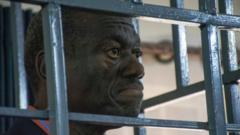Winnie Byanyima has condemned the Ugandan prison authorities' decision to ban visits on Christmas, voicing fears for her husband Kizza Besigye's well-being during his detention amid ongoing political tensions in the country.
Ugandan Politician's Wife Speaks Out Against Christmas Visit Ban

Ugandan Politician's Wife Speaks Out Against Christmas Visit Ban
Kizza Besigye’s wife criticizes the prison's restriction on visitation during the holiday season, expressing her concerns for his safety.
The wife of detained Ugandan opposition politician Kizza Besigye, Winnie Byanyima, has expressed her outrage over a prison ban that prevents inmates from receiving visitors during the Christmas period, labeling it "cruel and inhumane." Besigye, who is 68 years old, is facing military charges related to firearm possession and allegedly attempting to purchase weapons from abroad, charges he firmly refutes. His trial is currently postponed until next month.
Prison officials are imposing a seven-day visitation restriction starting on Christmas Eve as a security measure to mitigate "potential security lapses." Byanyima, who heads the United Nations organisation focused on combating HIV/AIDS, revealed her intention to camp outside Luzira Prison on Christmas Day to personally deliver food to her husband. She shared her concerns about his safety as he resides in a "tiny little room" secured behind multiple gates. "I will not leave Besigye's food at the gate. I don't trust them with him for even a single day," she declared, contemplating the possibility of sleeping outside the prison until she can see him.
Kizza Besigye's long history of political opposition includes four failed presidential campaigns against President Yoweri Museveni, who has been in power since 1986. Recent years have seen a decline in Besigye's political activity, as he did not contest the 2021 elections. However, he once again came into the spotlight last month after he was reportedly abducted in Kenya and forcibly returned to Uganda, leading to his current charges alongside his aide, Obeid Lutale.
The military court has extended Besigye's detention until 7 January, dashing hopes of a Christmas reunion for his family. Frank Baine Mayanja, spokesperson for the Uganda Prisons Service, justified the visitor ban as a necessary security measure during the festivities, arguing that Christmas often incites excitement among inmates which could lead to escape attempts.
He elaborated that the initial more extended visitation ban had been shortened, and dismissed concerns about changes in prison leadership as administrative matters unrelated to Besigye. Byanyima, however, raised suspicions regarding the new, inexperienced prison head, questioning the intentions of the authorities.
Mayanja suggested that Byanyima should trust the prison's capabilities in safeguarding her husband, asserting that all necessary measures were in place to keep him safe. This marks the second time that Besigye has spent Christmas in prison— the first being back in 2005 when he was arrested after attending a political rally.
Political tensions continue to simmer in Uganda, with military courts frequently used for civilian cases, despite constitutional rulings against such practices. Opposition parties assert that the Museveni administration's restrictions on political freedoms reflect a fear of competition, while supporters maintain that the president has ensured national stability throughout nearly four decades of rule.



















